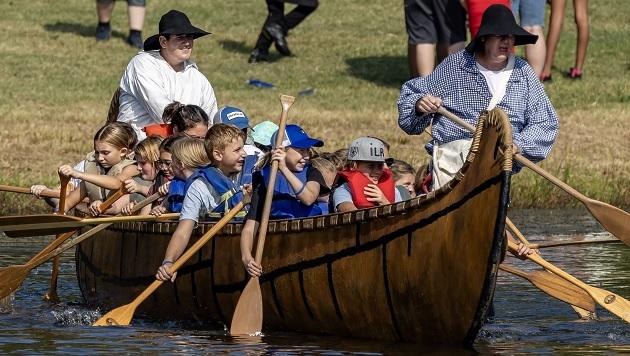Giving Students ‘A Reason To Be Connected to Our Rivers’
In Illinois, the National Great Rivers Research and Education Center, and Lewis and Clark Community College, inspire fifth graders to conserve and protect water

A fuzzy blue mascot in the shape of a water droplet greets the kids as they come off the bus, high fiving each one in welcome.
The kids—all Grade 5 students from southwest Illinois/St. Louis Metro East—are excited about a day of hands-on learning on the beautiful campus of Lewis and Clark Community College in Godfrey, IL.
As they step off the bus, they hit the ground running, guided to station after station for a day packed with activities. Each one is designed to help them develop ecological literacy and connect with a different aspect of water education—science, research, preservation, usage, consumption, conservation, safety, and recreation.
“A lot of our stations try to show students the land-water connection,” says Jen Mandeville, the organizer of the annual Water Festival for fifth graders. “We want them to realize that what we do on land affects our water.”
Mandeville is the Director of Environmental Education at the National Great Rivers Research and Education Center (NGRREC), an East Alton, IL-based research center dedicated to the study of great river systems and the communities that use them. In the state of Illinois, the Grade 5 science curriculum has a heavy water focus, she explains, adding that the festival’s activities are designed to meet—and often surpass—curricular requirements.
Since 2002, NGRREC has organized the annual festival in partnership with the college, helping thousands of kids expand their knowledge about water. In 2023, more than 900 students from 36 classes in five counties attended. The 2024 event, scheduled for Sept. 27, is expected to be even larger.
In preparation for the big day, teachers are invited to attend a free professional development workshop to help them develop classroom activities and worksheets to supplement what the students will learn at the event.
The National Great Rivers Research and Education Center’s Jerry F. Costello Field Station is located near the confluence of two of America’s great rivers—the Missouri and the Mississippi. Taking care of the rivers is integral to the well-being of the Riverbend community.
“We want every kid to go home with a new connection to water and a new appreciation for the water resources in the state of Illinois,” Mandeville adds.
Enbridge is proud to be supporting the 2024 Water Festival with a $10,000 Fueling Futures grant, awarded to the Lewis and Clark Community College Foundation. The event’s focus on environmental education aligns with our commitment to strengthening the sustainability of communities near our operations.
Protecting the watershed in and around Godfrey helps not only the village and its citizens, but also every community and landscape those great rivers flow through.
On the day of Water Festival, each of the 40 stations on offer is led by community members—non-profit organizations, government departments, scientists and businesses.
At one station, kids might learn about the impact of salts on root systems. At another, they’ll explore groundwater through an experiment with shave ice. One exhibitor plays a water cycle game with kids every year, to demonstrate that water is finite.
“A lot of students are floored when they learn that the water we drink today might have been inside a dinosaur’s body,” Mandeville says.
She recalls one student from a few years back who had an “aha!” moment at Water Festival.
“(The girl) became fired up,” Mandeville remembers. “She felt empowered to have her community take action, so she sponsored community cleanups and led weekly trash walks in her neighborhood.”
Reflecting on this student, Mandeville observes that what the little girl experienced is exactly what they hope for all students at Water Festival.
“We believe as educators that when people experience a natural resource, they’re so much more compelled to protect it or at least help it stay healthy and available for future generations. Those moments have an impact,” she says.
“After Water Festival, students now have a story and a reason to be connected to our rivers.”

